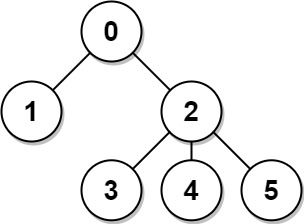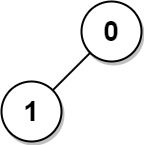| comments | difficulty | edit_url | tags | ||||
|---|---|---|---|---|---|---|---|
true |
Hard |
|
There is an undirected connected tree with n nodes labeled from 0 to n - 1 and n - 1 edges.
You are given the integer n and the array edges where edges[i] = [ai, bi] indicates that there is an edge between nodes ai and bi in the tree.
Return an array answer of length n where answer[i] is the sum of the distances between the ith node in the tree and all other nodes.
Example 1:
Input: n = 6, edges = [[0,1],[0,2],[2,3],[2,4],[2,5]] Output: [8,12,6,10,10,10] Explanation: The tree is shown above. We can see that dist(0,1) + dist(0,2) + dist(0,3) + dist(0,4) + dist(0,5) equals 1 + 1 + 2 + 2 + 2 = 8. Hence, answer[0] = 8, and so on.
Example 2:
Input: n = 1, edges = [] Output: [0]
Example 3:
Input: n = 2, edges = [[1,0]] Output: [1,1]
Constraints:
1 <= n <= 3 * 104edges.length == n - 1edges[i].length == 20 <= ai, bi < nai != bi- The given input represents a valid tree.
First, we run a DFS to calculate the size of each node's subtree, recorded in the array
Next, we run another DFS to enumerate the sum of distances from each node when it is considered as the root. Suppose the answer for the current node
The time complexity is
Similar problems:
class Solution:
def sumOfDistancesInTree(self, n: int, edges: List[List[int]]) -> List[int]:
def dfs1(i: int, fa: int, d: int):
ans[0] += d
size[i] = 1
for j in g[i]:
if j != fa:
dfs1(j, i, d + 1)
size[i] += size[j]
def dfs2(i: int, fa: int, t: int):
ans[i] = t
for j in g[i]:
if j != fa:
dfs2(j, i, t - size[j] + n - size[j])
g = defaultdict(list)
for a, b in edges:
g[a].append(b)
g[b].append(a)
ans = [0] * n
size = [0] * n
dfs1(0, -1, 0)
dfs2(0, -1, ans[0])
return ansclass Solution {
private int n;
private int[] ans;
private int[] size;
private List<Integer>[] g;
public int[] sumOfDistancesInTree(int n, int[][] edges) {
this.n = n;
g = new List[n];
ans = new int[n];
size = new int[n];
Arrays.setAll(g, k -> new ArrayList<>());
for (var e : edges) {
int a = e[0], b = e[1];
g[a].add(b);
g[b].add(a);
}
dfs1(0, -1, 0);
dfs2(0, -1, ans[0]);
return ans;
}
private void dfs1(int i, int fa, int d) {
ans[0] += d;
size[i] = 1;
for (int j : g[i]) {
if (j != fa) {
dfs1(j, i, d + 1);
size[i] += size[j];
}
}
}
private void dfs2(int i, int fa, int t) {
ans[i] = t;
for (int j : g[i]) {
if (j != fa) {
dfs2(j, i, t - size[j] + n - size[j]);
}
}
}
}class Solution {
public:
vector<int> sumOfDistancesInTree(int n, vector<vector<int>>& edges) {
vector<vector<int>> g(n);
for (auto& e : edges) {
int a = e[0], b = e[1];
g[a].push_back(b);
g[b].push_back(a);
}
vector<int> ans(n);
vector<int> size(n);
function<void(int, int, int)> dfs1 = [&](int i, int fa, int d) {
ans[0] += d;
size[i] = 1;
for (int& j : g[i]) {
if (j != fa) {
dfs1(j, i, d + 1);
size[i] += size[j];
}
}
};
function<void(int, int, int)> dfs2 = [&](int i, int fa, int t) {
ans[i] = t;
for (int& j : g[i]) {
if (j != fa) {
dfs2(j, i, t - size[j] + n - size[j]);
}
}
};
dfs1(0, -1, 0);
dfs2(0, -1, ans[0]);
return ans;
}
};func sumOfDistancesInTree(n int, edges [][]int) []int {
g := make([][]int, n)
for _, e := range edges {
a, b := e[0], e[1]
g[a] = append(g[a], b)
g[b] = append(g[b], a)
}
ans := make([]int, n)
size := make([]int, n)
var dfs1 func(i, fa, d int)
dfs1 = func(i, fa, d int) {
ans[0] += d
size[i] = 1
for _, j := range g[i] {
if j != fa {
dfs1(j, i, d+1)
size[i] += size[j]
}
}
}
var dfs2 func(i, fa, t int)
dfs2 = func(i, fa, t int) {
ans[i] = t
for _, j := range g[i] {
if j != fa {
dfs2(j, i, t-size[j]+n-size[j])
}
}
}
dfs1(0, -1, 0)
dfs2(0, -1, ans[0])
return ans
}function sumOfDistancesInTree(n: number, edges: number[][]): number[] {
const g: number[][] = Array.from({ length: n }, () => []);
for (const [a, b] of edges) {
g[a].push(b);
g[b].push(a);
}
const ans: number[] = new Array(n).fill(0);
const size: number[] = new Array(n).fill(0);
const dfs1 = (i: number, fa: number, d: number) => {
ans[0] += d;
size[i] = 1;
for (const j of g[i]) {
if (j !== fa) {
dfs1(j, i, d + 1);
size[i] += size[j];
}
}
};
const dfs2 = (i: number, fa: number, t: number) => {
ans[i] = t;
for (const j of g[i]) {
if (j !== fa) {
dfs2(j, i, t - size[j] + n - size[j]);
}
}
};
dfs1(0, -1, 0);
dfs2(0, -1, ans[0]);
return ans;
}

